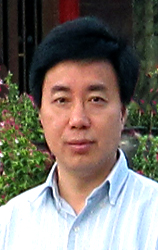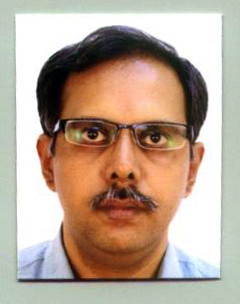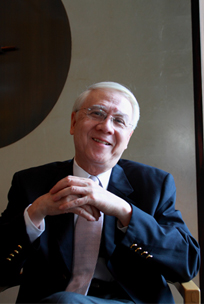|
Keynote Talks
Keynote Talk 1: Ubiquitous Personalized Information Fusion on the Web
Prof. Xindong Wu
Dept. of Computer Science
University of Vermont, USA
Email: xwu@cs.uvm.edu
Keynote Talk 2: Multi-Agent Systems based Simulation for Learning
Prof. Kamalakar Karlapalem
International Institute of Information Technology (IIIT), Hyderabad, India
Email: kamal@iiit.ac.in
Keynote Talk 3: Discovery, Invention, and Innovation
Prof. David C. L. Liu
National Tsing Hua University, Taiwan
Email: liucl@mx.nthu.edu.tw
Keynote Talk 4: Supporting Blended Learning with Online and Mobile Technologies
Prof. Wanlei Zhou
Chair Professor of Information Technology and Head
School of Information Technology
Deakin University, Australia
Email: wanlei@deakin.edu.au
Ubiquitous Personalized Information Fusion on the Web
Prof. Xindong Wu
Dept. of Computer Science, University of Vermont, USA
Email: xwu@cs.uvm.edu
Abstract:
Ubiquitous personalized information processing integrates inexpensive and networked information from multiple devices and heterogeneous systems simultaneously, based on individual users' interests. Information fusion in a ubiquitous personalized application involves a positive cycle of (a) demand-driven integration of information sources, (b) mining and analysis of the integrated information, (c) user interest modeling based on individual users' needs, wants and past behaviors, and (d) security/privacy considerations both before and after integration. This talk reviews influential data mining algorithms that can be utilized in these information fusion activities, introduces data mining applications for ubiquitous personalized information fusion, and presents research challenges in intelligent informatics, active information fusion, and adaptive interest modeling and monitoring. Adaptive interest modeling and monitoring deals with concept drifting from both information sources and the user's needs and wants, to provide customized information services. Example applications include Web news filtering and summarization, and adaptive information presentation in user-centered biological information retrieval on the Web. |
| Biograpy: |
 |
Xindong Wu is a Professor in Computer Science at the University of Vermont, USA. He holds a PhD in Artificial Intelligence from the University of Edinburgh, Britain. His research interests include data mining, knowledge-based systems, and Web information exploration. He has published over 200 refereed papers in these areas in various journals and conferences, including IEEE TKDE, TPAMI, ACM TOIS, DMKD, KAIS, IJCAI, AAAI, ICML, KDD, ICDM, and WWW, as well as 25 books and conference proceedings. His research has been supported by the U.S. National Science Foundation (NSF), the U.S. Department of Defense (DOD), the National Natural Science Foundation of China (NSFC), and the Chinese Academy of |
Sciences, as well as industrial companies including Microsoft Research, U.S. West Advanced Technologies and Empact Solutions.
Dr. Wu is the founder and current Steering Committee Chair of the IEEE International Conference on Data Mining (ICDM), the founder and current Editor-in-Chief of Knowledge and Information Systems (KAIS, by Springer), the Founding Chair (2002-2006) of the IEEE Computer Society Technical Committee on Intelligent Informatics (TCII), and a Series Editor of the Springer Book Series on Advanced Information and Knowledge Processing (AI&KP). He was the Editor-in-Chief of the IEEE Transactions on Knowledge and Data Engineering (TKDE, by the IEEE Computer Society) between January 1, 2005 and December 31, 2008. He served as Program Committee Chair for ICDM '03 (the 2003 IEEE International Conference on Data Mining) and as Program Committee Co-Chair for KDD-07 (the 13th ACM SIGKDD International Conference on Knowledge Discovery and Data Mining), and is currently serving as Program Committee Chair (Knowledge Management Track) for CIKM 2010 (the 19th ACM Conference on Information and Knowledge Management).
Professor Wu is the 2004 ACM SIGKDD Service Award winner, the 2006 IEEE ICDM Outstanding Service Award winner, and a 2005 Chair Professor in the Changjiang (or Yangtze River) Scholars Programme at the Hefei University of Technology (appointed by the Ministry of Education of China in 2006).
He has been an invited/keynote speaker at numerous international conferences including IEEE GrC 2009, IDEAL 2009, JCKBSE 2008, HAIS 2008, NSF-NGDM'07, PAKDD-07, IEEE EDOC'06, IEEE ICTAI'04, IEEE/WIC/ACM WI'04/IAT'04, SEKE 2002, and PADD-97. |
Multi-Agent Systems based Simulation for Learning
Prof. Kamalakar Karlapalem
International Institute of Information Technology (IIIT), Hyderabad, India
Email: kamal@iiit.ac.in
Abstract:
Agent is a software (program) or an embedded system (with h/w and s/w like robot) that can perceive its environment, communicate with other agents and work towards accomplishing its goals. For example, a team consisting of software soccer agents (players) or (humanoid) robots can play a soccer match with the team and individual goal of winning the match. Multi-agent systems is a mature field of research with recent work focusing on simulating complex systems.
In this talk, we shall concentrate on the role of multi-agent systems based simulation for learning by considering specific applications such as RoboCup competitions and Trading agent competitions. Further, we shall address important challenges for scaling up multi-agent based systems for simulating more realistic and complex environments. In particular, we shall present our current work on building (near) real time multi-agent based simulation framework. |
| Biograpy: |
 |
Kamal Karlapalem is a Professor and Head of Centre for Data Engineering at IIIT-Hyderabad. He has a PhD in computer Science from Georgia Tech in 1992. He was a Computer Science faculty member at HKUST from 1992 to 2000. He has published in the areas of multi-agent systems, data mining, workflow systems and database systems. His student teams have won third prize in RoboCup Rescue Simulation in 2005, Best New Agent in Trading agent competition in 2007, and VAST 2009 Challenge award. His current research areas are |
| multi-agent based simulation, visual data analytics and database systems. |
Discovery, Invention, and Innovation
Prof. David C. L. Liu
National Tsing Hua University, Taiwan
Email: liucl@mx.nthu.edu.tw
Abstract:
Development of computer and communication technologies in the last half century has made the world a smaller and a flatter one. In a smaller world, we can have closer exchanges and cooperation. In a flatter world, we can have fairer competitions. We shall discuss, with the advancement of computer and communication technologies, how to build a sharing, harmonious, and prosperous society. |
| Biograpy: |
 |
C. L. Liu received his B. Sc. degree at the National Cheng Kung University in Taiwan and his S. M. and Sc. D. degrees from the Massachusetts Institute of Technology. His teaching career spans over forty years, at MIT, the University of Illinois at Urbana Champaign, and the National Tsing Hua University, where he is now the William Mong Honorary Chair Professor of Computer Science. His academic administrative duties include serving as Associate Provost at the University of Illinois at Urbana Champaign from 1996 to 1998, and as President of the National Tsing Hua University from 1998 to 2002.
His research areas are: computer-aided design of VLSI circuits, computer-aided instruction, real-time systems, combinatorial optimization, and discrete mathematics. He has published over 180 technical papers, and 8 technical books. In addition, he has published three books which are essay collections. |
He serves on the Boards of a number of high tech companies and educational and charitable foundations in Taiwan, Hong Kong, and the US. Since 2005, he hosts a weekly radio show on Technology and Humanities in the radio station IC975 in Hsinchu.
He is a member of Academia Sinica, and a Fellow of IEEE and ACM. |
Supporting Blended Learning with Online and Mobile Technologies
Prof. Wanlei Zhou
Chair Professor of Information Technology and Head
School of Information Technology, Deakin University, Australia
Email: wanlei@deakin.edu.au
Abstract:
Over the last decade e-learning has improved the access and delivery of learning content in higher education. However many traditional learning methodologies developed through classroom based learning are still in place and functioning well, hence a blended approach to learning that incorporates successful traditional learning methodologies such as ice breaking, collaboration, voice and images into e-learning is a natural way to support the students learning experience.
In this talk we focus on the development of a blended learning model and the integration of online and mobile technologies with the above-mentioned traditional learning methodologies. In particular, we focus on the use of wikis, e-lectures (voice and video lectures synchronised with PowerPoint presentations) and mobile phones to integrate various traditional learning methodologies into e- learning, enabling students to be immersed in a blended learning environment. Through the use of the selected technologies, we are able to provide a blended learning environment to support the students learning experience in an adaptive way. That is, our blended learning environment will enable students to choose different learning methodologies and learning content according to their own preferences, which may be influenced by their own learning style and cultural background. |
| Biograpy: |
|
Professor Wanlei Zhou received the B.Eng (Computer Science and Engineering) and M.Eng (Computer Science and Engineering) degrees from Harbin Institute of Technology, Harbin, China in 1982 and 1984, respectively, and the PhD degree from The Australian National University, Canberra, Australia, in 1991. He also received a DSc degree (a higher Doctorate degree) from Deakin University in 2002 for his substantial contribution to knowledge and authoritative standing in the field of distributed computing. He is currently the Chair |
Professor in Information Technology and Head of School, School of Information Technology, Deakin University. Before joining Deakin University, Professor Zhou has been a system programmer in HP at Massachusetts, USA; a lecturer in Monash University, Melbourne, Australia; and a lecturer in National University of Singapore, Singapore. His research interests include theory and practical issues of building distributed systems, security and reliability of computer networks, bioinformatics, and e-learning.
Professor Zhou has published more than 200 papers in refereed international journals and refereed international conferences proceedings. Professor Zhou has edited 5 books and authored 1 book. He has also chaired a number of international conferences. Prof Zhou is a Senior Member of the IEEE. |
|














